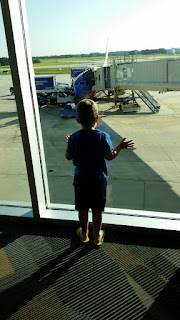This past week, my family and I took a family vacation to Clearwater, Florida. This was our first big vacation we have taken with all three kids. There were many firsts on this vacation - first time flying on an airplane for our youngest, first time swimming in the ocean, first time collecting sea shells, first time riding the waves, first time getting sun burned... the list goes on and on.
As we were having our last dinner together in Florida, we spent some time talking about our favorite parts of the trip (this is often a dinner table discussion for us we call "Best and Worst" where each family member shares the best part of their day and the worst part of their day to learn from one another). As each family member took the time to share their best and worst parts of the vacation, I took away key lessons from our time together.
Excitement
I loved seeing the excitement on our children's faces with each new adventure. The days leading up to our vacation were filled with unbridled enthusiasm. Every day, they would talk about how many more days until our vacation. The shuttle ride from the commuter lot to the airport was a thrill. As the kids were waiting in the terminal for the airport with weighted breath for our airplane to arrive, there was a sense of wonder and awe for the adventure waiting for us. Each night as we were getting ready for bed, our kids would ask "What are we going to do tomorrow?" Their genuine excitement for the next day was contagious! As educators, how are we creating experiences where are students are excited and thrilled for the next day? How do we end the day so our students are more excited about tomorrow than they were today?
Curiosity
For the weeks leading up to Florida, our five year-old son talked and talked about his plan for the beach. He was going to dig a tunnel in the sand leading to the ocean so that the water would come "rushing out and shoot out like a volcano" and if that didn't work he was going to "dig a tunnel in the sand to pop up in the ocean". I didn't want to break his spirit because he was so convinced his plan was going to work. When he tried this the first day at the beach, he realized his great plan was not going to work. He adjusted his thinking to let the waves fill up his trenches as opposed to digging a giant tunnel under the ocean. As educators, how are we fostering our learners' curiosity? Are we quick to correct these curious ideas or do we let them grow and experience them for themselves? How do we let the natural curiosity of our learners help steer the learning process?
Schema
About four years ago, we visited my family on the East Coast and went to a beach in New Hampshire. Our children were not old enough to remember that visit so this trip was essentially the first trip to the beach they would remember. On the first morning, we were going to walk the beach and find sea shells. The walk from the resort to the ocean was a good 400 yards and they were thrilled with the amount of tiny sea shells they were finding right outside the resort. They collected shell after shell in their buckets and pails - so much that their buckets were overflowing. Little did they know that the larger and more intricate shells were waiting for them closer to the ocean. That night, we walked the beach after the tide had gone out and they found more and more shells to add to their collection. They simply did not know that they could find larger and "prettier" shells closer to the ocean. As educators, how are we developing our learners' schema to help them better understand concepts? How are we helping learners bridge the gap between their background knowledge and what is being discussed and learned?

Risk Taking
Our kids LOVED the water. There was even one morning when our youngest woke up at 7 to go swimming when the pool opened. Our oldest is a good swimmer who is just learning how to swim longer distances. Our middle child still uses floaties to help him swim. Our youngest just loves to splash in the water and is still a bit hesitant about being in water where she cannot touch the bottom. The first day, all three children were sitting on the step deciding how to get into the pool. Once they tried it out the new pool and tested the waters, it was non-stop swimming the rest of the week. As educators, how are we developing our own ability to take risks? How are we developing risk-taking in the classrooms? How are we allowing learners at various levels develop a growth-mindset and become risk-takers without the fear of failure?
Re-energize
A couple mornings and evenings, I headed out to the beach for the sunrise and sunset. It was an extremely peaceful time as I was alone on the beach listening to the sounds of the waves crash along the beach. These sounds helped me remember how lucky we are to live in such a place where all of our worries can disappear (at least for a week or so). As educators, how do we take the time to re-energize and re-charge our batteries throughout the school year and summer? How do we take care of ourselves so we can be the best we can be each and every day?
Our trip to the beach was full of exciting times, wonderful memories, and lessons for us all. As we were driving home from the airport, our youngest asked, "When do we get to back?" I am sure this vacation will be one they remember for a long time!



